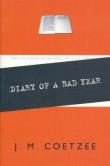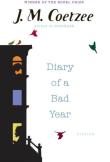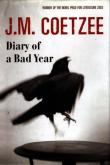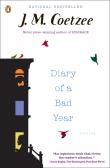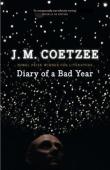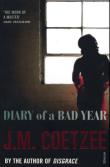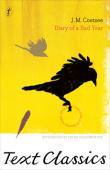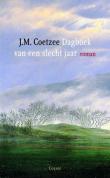AustLit
Latest Issues
AbstractHistoryArchive Description
Notes
-
Included in the New York Times Book Review 100 Notable Books List for 2008.
-
Editions and translations have been updated for Diary of a Bad Year by Eilish Copelin as part of a Semester 2, 2013 scholar's internship. The selection and inclusion of these editions and translations was based on their availability through Australian libraries, namely through the search facilities of Libraries Australia and Trove (National Library of Australia).
Given the international popularity of Coetzee's work, however, this record is not yet comprehensive. Editions and translations not widely available in Australia may not have been indexed. Furthermore, due to the enormous breadth of critical material on Coetzee's work, indexing of secondary sources is also not complete.
Affiliation Notes
-
Associated with the AustLit subset Australian Literary Responses to 'Asia' as the work contains a Filipino character.
Contents
- Introduction, essay
Publication Details of Only Known VersionEarliest 2 Known Versions of
Other Formats
- Also large print and electronic resource.
Works about this Work
-
Diary of a Bad Year
2023
single work
criticism
— Appears in: The Bloomsbury Handbook to J. M. Coetzee 2023; (p. 181-190) -
Self-Aware Self-Censorship As Form
2018
single work
essay
— Appears in: Electronic Book Review , May 2018;'A dedicated, elaborated thought stream from an author who, like McElroy, has read and thought about the presence of censorship (as theme and experience) in novels by Ross Gibson, Shariar Mandinipour,J. .M. Coetzee, W. G. Sebald, Mark Z Danielewski, Italo Calvino, and Fernando Pessoa. Author David Thomas Henry Wright explores the (loss of) authority of the literary novel in a time of “networked glut” while at the same time seeking trans-national, trans-historical, photographic, multi-medial and inter-generational “alliances” that might redress contemporary censorship and “deeply shape (or erode) contemporary literature.”'
Source: Abstract.
-
“Do You Think I Can’t Read between the Lines?” : Discourse of the Unsaid in J. M. Coetzee’s Diary of a Bad Year
2018
single work
criticism
— Appears in: The Journal of Commonwealth Literature , vol. 53 no. 1 2018; (p. 7-20)'This article examines J. M. Coetzee’s use of intuitive and interpretive exchanges within and across the tripartite structure of Diary of a Bad Year (2007). It argues that Coetzee rejects strict understandings of the novel genre in favour of a more fluid form, enabling him to explore heteroglot exchanges within the two monologues on each page of Diary of a Bad Year and complicate conventional understandings of Bakhtin’s theory of dialogism. Creating multiple layers that begin with unspoken words, pass through an “othered” interpreter, and arrive at the reader via the novel’s narration, meaning is reconfigured and reconsidered in a way that distances it from the author. The essay further argues that Coetzee’s use of dialogic discourse in Diary of a Bad Year privileges the perspective of the Filipina woman whose voice drives much of the novel’s commentary as she wins the interpretive game Coetzee creates.' (Publication abstract)
-
Eurydice’s Curse : J. M. Coetzee and the Prospect of Death
2018
single work
criticism
— Appears in: Australian Literary Studies , February vol. 33 no. 1 2018;'The prospect of death is one of J. M. Coetzee’s central and enduring concerns. As David Attwell observes in his biography, ‘The most trenchant of the purposes of Coetzee’s metafiction . . . is that it is a means whereby he challenges himself with sharply existential questions’. My claim in this essay is that Coetzee uses the act of writing existentially to orient himself and his readers to the prospect of death. I argue that Coetzee treats the myth of Orpheus and Eurydice as a story about how to deal with the prospect of death. What seems to terrify the Coetzeean protagonist is the thought of the absolute solitariness of death. I call this the curse of Eurydice. Eurydice’s fate in the myth is to be left alone in the Underworld, dying for a second time after her impatient lover turns to gaze at her before they have safely reached the surface of the earth. To take Eurydice’s point of view in the story is to begin to glimpse the solitariness of death. One of the roles of women in Coetzee’s fiction, I suggest, is to mitigate the male character’s fear of this solitariness by conducting him to the threshold of death, but no further.' (Publication abstract)
-
“A Face Without Personality” : Coetzee’s Swiftian Narrators
2016
single work
criticism
— Appears in: Ariel , July vol. 47 no. 3 2016; (p. 1-22) 'Much has been written about the complicated intertextual relationships between J. M. Coetzee’s novels and previous works by writers such as Franz Kafka, Fyodor Dostoevsky, Samuel Beckett, and, especially, Daniel Defoe. Relatively little has been written, in comparison, about any relationship between Coetzee and Defoe’s great contemporary, Jonathan Swift. We claim no extensive structural relationship between Coetzee’s novels and Swift’s works—nothing like the formal interlace between Robinson Crusoe and Foe, for example. We do claim, however, a strong and explicitly signalled likeness of narrative stance, marked especially by the ironic distance between author and protagonist in Gulliver’s Travels and Elizabeth Costello. We rehearse the extensive evidence of Coetzee’s attention to Swift (both in novels and criticism) and suggest that there is a Swiftian dimension to Coetzee’s oeuvre that is evident in several books, including Dusklands, Youth, Elizabeth Costello, and Diary of a Bad Year.' (Publication abstract)
-
The Master's Voices
2007
single work
review
— Appears in: The Age , 25 August 2007; (p. 20)
— Review of Diary of a Bad Year 2007 single work novel -
Be It Poetry or Polemic, It's a Natter of Opinion
2007
single work
review
— Appears in: The Weekend Australian , 25-26 August 2007; (p. 23)
— Review of Diary of a Bad Year 2007 single work novel -
Diary of a Bad Year: Good Things Come in Threes
2007
single work
review
— Appears in: The Sydney Morning Herald , 25-26 August 2007; (p. 32)
— Review of Diary of a Bad Year 2007 single work novel -
[Review] Diary of a Bad Year
2007
single work
review
— Appears in: Bookseller + Publisher Magazine , August vol. 87 no. 2 2007; (p. 32)
— Review of Diary of a Bad Year 2007 single work novel -
'Diary' in Three-Part Disharmony
2007
single work
review
— Appears in: The Canberra Times , 1 September 2007; (p. 11)
— Review of Diary of a Bad Year 2007 single work novel -
Graphic Texts Are a Novel Alternative
2007
single work
column
— Appears in: The Age , 25 August 2007; (p. 28) -
Coetzee 'Diary' Targets PM
2007
single work
column
— Appears in: The Weekend Australian , 25-26 August 2007; (p. 5) -
Writers on the Wing : Birds and the (De/Re)construction of Cultural Memory in Patrick Chamoiseau and J. M. Coetzee's Fictional Narratives
2007
single work
criticism
— Appears in: Kunapipi , vol. 29 no. 2 2007; (p. 178-193) -
What is to be Done?
2008
single work
essay
— Appears in: Wet Ink , Winter no. 11 2008; (p. 8-13) -
In Praise of Slow Reading
2010
single work
criticism
— Appears in: The Canberra Times , 2 January 2010; (p. 12) Publishers and literary agents are interested in publishing books that readers will buy. By promoting new releases as 'page turners', which can be read quickly, the culture of serious and contemplative reading, together with the culture of writing and publishing are devalued.
Awards
- 2009 longlisted International IMPAC Dublin Literary Award
- 2008 longlisted Australia-Asia Literary Award
- 2008 shortlisted Queensland Premier's Literary Awards — Best Fiction Book
- 2008 shortlisted Victorian Premier's Literary Awards — Prize for Fiction
- 2008 shortlisted The Age Book of the Year Award — Fiction Prize
- Sydney, New South Wales,

